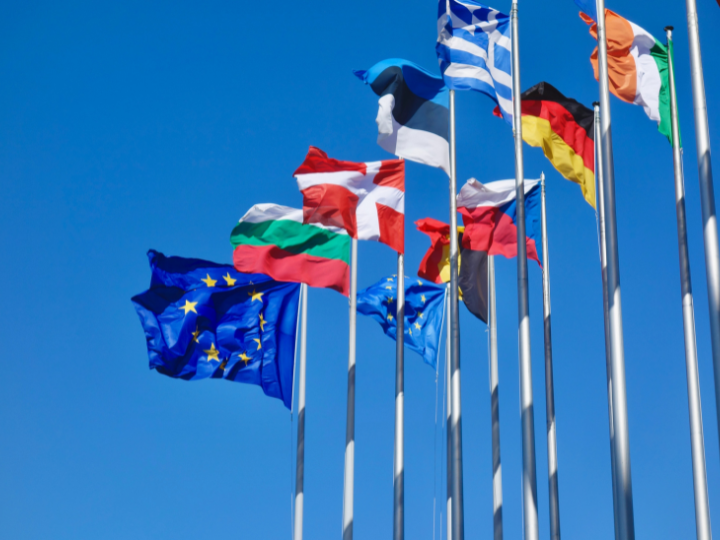by Jonathan Packroff
As the focus of EU leaders’ attention shifts away from the economic debate towards migration, a statement on economic “solidarity” within the EU was removed from the draft joint statement ahead of Thursday’s (9 February) summit in Brussels.
Faced with mounting concerns about the competitiveness of European industries, EU leaders had aimed to discuss industrial policy, including the need for subsidies in response to foreign offerings like those under the US Inflation Reduction Act (IRA).
However, as severe differences among EU countries became apparent, leaders seemed less keen to discuss the issue in detail.
In a draft summit communique shared with EU leaders on Monday (6 February) and seen by EURACTIV, a paragraph on “solidarity” and a “fully effective EU policy response” was deleted from the draft conclusions.
“To this end, the European Council invites the Commission and the Council to take work forward building notably on the success of the SURE programme,” read the previous version, which was now scrapped.
The SURE programme, part of the EU’s response to the COVID-19 pandemic, involved borrowing on financial markets by the European Commission in order to allow more favourable borrowing conditions for countries with traditionally higher interest rates on their national debt.
The newer version of summit conclusions only makes reference to “existing EU funds”, which “should be deployed in a more flexible manner, and options to facilitate access to finance should be explored”.
It still mentions the Commission’s aim to propose a “European Sovereignty Fund”, but without making any supportive statement.
“The European Council takes note of the Commission’s intention to propose a European Sovereignty Fund before summer 2023 to support investment in strategic sectors,” the proposed conclusions read.
German chancellor sparks optimism, rejects doom prophecies
This is in line with the position of Germany, the EU’s biggest economy, which has opposed any new joint borrowing and argued that rechannelling existing EU funds would be sufficient to support industrial competitiveness.
This was reiterated by Social Democrat Chancellor Olaf Scholz in the German Bundestag on Wednesday (8 February) ahead of the European Council meeting.
“The Recovery Facility alone, which we created during the Corona Pandemic, is worth 250 billion for the decarbonisation of European industry,” Scholz said, adding that “only a small part of that has been spent so far.”
He said “Europe has no reason to hide”, pointing to the additional €20 billion in the ‘REPowerEU’ programme, which aims to bolster independence from Russian fossil fuel imports, €26 billion of EU guarantees for private and public investments from the ‘InvestEU’ programme, 40 billion for research and innovation, and the existing means from the EU’s cohesion fund as well as revenue from the Emissions Trading System.
This compares to $370 billion (€344 billion) envisaged in the US IRA, Scholz highlighted.
“As right as it is that we deal with the consequences of this policy [the US IRA] for Europe,” Scholz said, he stressed there was no need for gloomy prophecies.
Nevertheless, rules for national subsidies would need to be more flexible and approval periods made quicker, he warned.
“In order to strengthen Europe in global competition, we must, firstly, get serious with this announced flexibilisation of European state aid rules, specifically in the sectors we need for transformation,” he said.
“And secondly, we will expand our European production capacities for advanced, clean technologies, for example in the energy, construction and transport sectors,” Scholz said, noting support for European Commission President Ursula von der Leyen’s “Green Deal Industrial Plan“.
German government split on new joint borrowing
Within the German government, there have been different signals regarding renewed joint borrowing at the EU level. While liberal Finance Minister Christian Lindner firmly rejected any idea of new EU debt, Green Economy Minister Robert Habeck seemed more open.
After the Economy Commissioner Paolo Gentiloni’s visit to Berlin last week, Habeck promised to “engage constructively” in the debate at the EU level, adding that “the important thing here is not to look first at what doesn’t work, but how we can organise a strong common response.”
In the German parliament, this disunity was slammed by the leader of the conservative opposition, Friedrich Merz (CDU/EPP).
He criticised “weeks and months of speechlessness in the EU from Germany about the IRA,” adding that this went up to the point where “the permanent representative of Germany, the ambassador to the EU, complains publicly that he is not able to speak in the EU bodies because there is no common position of the German government”.
In a situation like this, Merz said, “competitiveness is not damaged and compromised by Brussels policies, but by the disagreement and the weeks of bickering in your coalition”, a reference to the three-party ruling alliance comprising the Social Democrats, liberals, and Greens.
*first published in: Euractiv.com




 By: N. Peter Kramer
By: N. Peter Kramer

